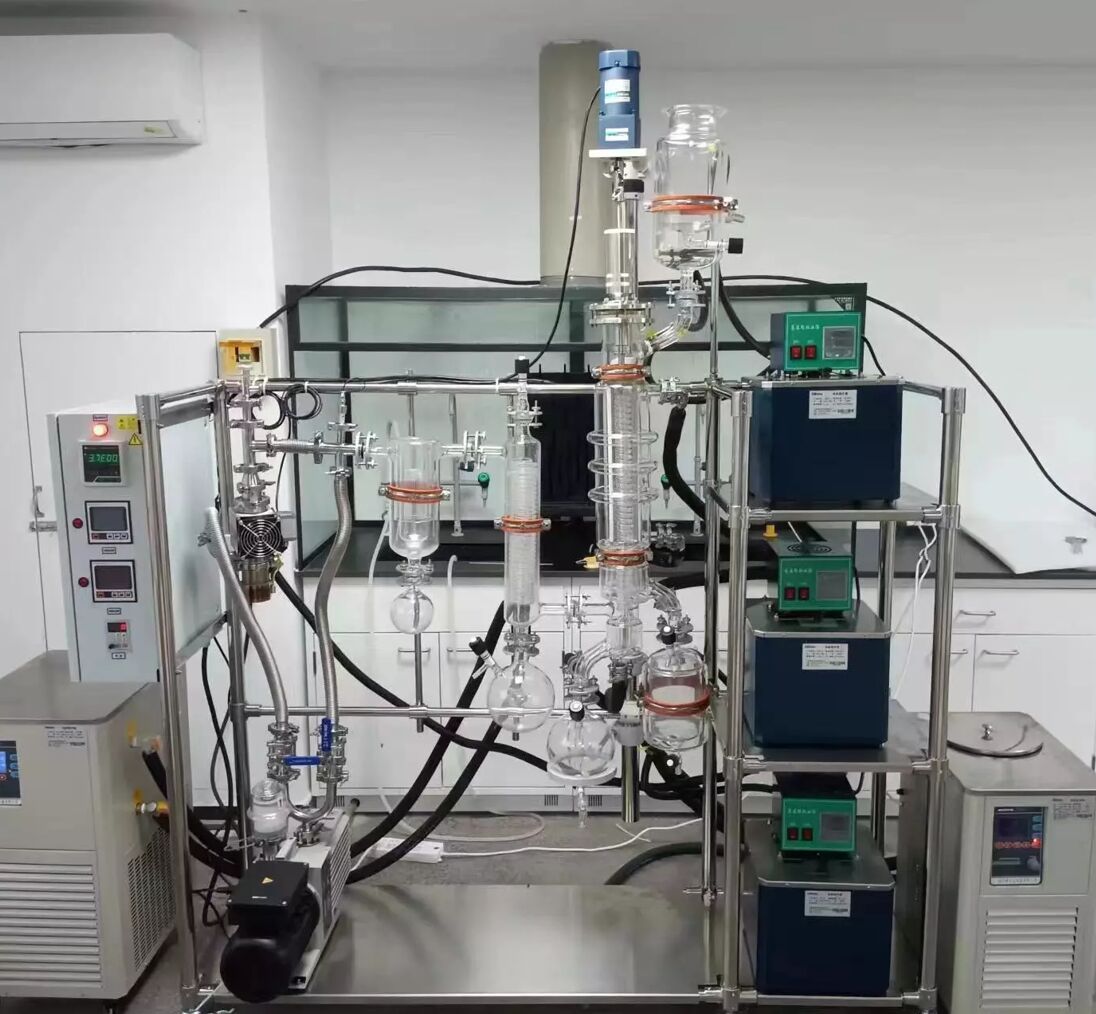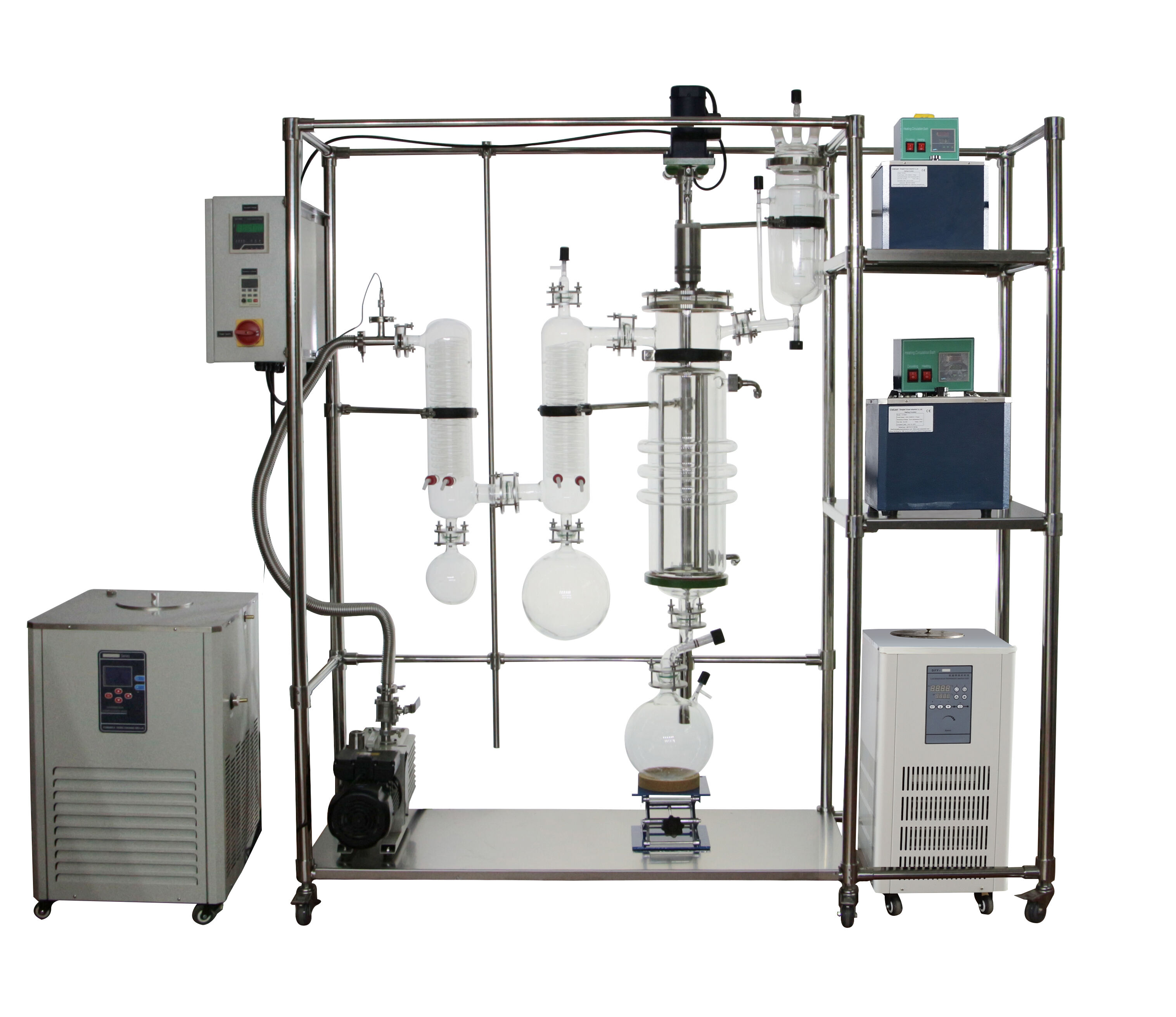Why Is Wiped Film Molecular Distillation Trusted in Fine Chemicals?
In the fine chemicals industry, where precision, purity, and consistency are critical, Wiped Film Molecular Distillation has emerged as a trusted separation technique. Fine chemicals—including pharmaceuticals, specialty solvents, flavors, fragrances, and advanced materials—require rigorous purification to meet strict quality standards. Traditional distillation methods often fall short, as they can damage heat-sensitive compounds or fail to separate closely related molecules. Wiped Film Molecular Distillation, however, addresses these challenges with its unique design and operating principles. This guide explains why Wiped Film Molecular Distillation is relied upon in fine chemicals, highlighting its key benefits and applications.
Gentle Processing for Heat-Sensitive Compounds
Fine chemicals often include heat-sensitive molecules, such as active pharmaceutical ingredients (APIs), natural extracts, or specialty polymers, which degrade at high temperatures. Traditional distillation relies on high heat to vaporize compounds, risking chemical breakdown, loss of potency, or the formation of unwanted byproducts. Wiped Film Molecular Distillation solves this by operating under high vacuum and low temperatures, making it ideal for delicate materials.
In Wiped Film Molecular Distillation, the system creates a high vacuum (typically 0.001 to 1 mmHg), which lowers the boiling points of compounds significantly. For example, a compound that boils at 300°C at atmospheric pressure might vaporize at just 100°C under high vacuum. This reduced temperature protects heat-sensitive molecules from degradation, preserving their chemical structure and functionality.
The “wiped film” mechanism also plays a role: a rotating wiper spreads the liquid into a thin film (0.1–1 mm thick) across a heated surface, ensuring rapid, uniform heat transfer. This minimizes the time the material spends in contact with heat, further reducing the risk of thermal damage. For fine chemicals like pharmaceuticals or natural flavors, this gentle processing is essential to maintain product efficacy and quality.
Superior Separation of Complex Mixtures
Fine chemical processes often involve separating complex mixtures with closely related compounds—such as isomers, homologs, or molecules with similar boiling points. Traditional distillation struggles with these separations because it relies on differences in boiling points, which may be minimal in such cases. Wiped Film Molecular Distillation, however, achieves separation based on molecular weight and volatility, enabling more precise purification.
In this technique, vaporized molecules travel a short distance (typically a few centimeters) from the heated film to a cooled condenser. Lighter, more volatile molecules reach the condenser first and condense into the purified product, while heavier, less volatile molecules remain in the liquid phase and are removed as residue. This short path length reduces the chance of recondensation or mixing, allowing even slightly different molecules to be separated effectively.
For example, in the production of specialty solvents or pharmaceutical intermediates, Wiped Film Molecular Distillation can isolate a target compound with purity levels exceeding 99%, even when other methods fail to achieve such precision. This level of separation is critical in fine chemicals, where impurities can compromise product performance or safety.

High Purity Output for Strict Standards
Fine chemicals are subject to rigorous regulatory standards, especially in industries like pharmaceuticals, where impurities can pose health risks. Wiped Film Molecular Distillation consistently delivers high-purity products, making it a trusted choice for meeting these standards.
The combination of high vacuum, low temperature, and precise separation ensures that contaminants—such as heavy metals, residual solvents, or byproducts—are effectively removed. Unlike filtration or chromatography, which may leave trace impurities, Wiped Film Molecular Distillation physically separates molecules based on their properties, resulting in cleaner products.
For example, in the production of APIs, even tiny amounts of impurities can affect a drug’s safety or efficacy. Wiped Film Molecular Distillation removes these impurities, ensuring the final product meets pharmacopeial standards (such as USP, EP, or JP). Similarly, in flavor and fragrance manufacturing, it isolates pure aromatic compounds without altering their scent or taste, which is essential for product consistency.
Efficiency and Scalability for Production Needs
Fine chemical manufacturers require processes that are both efficient and scalable, whether producing small batches for research or large volumes for commercial use. Wiped Film Molecular Distillation meets both needs, offering high throughput and adaptability across production scales.
In terms of efficiency, the thin film created by the wiping mechanism maximizes the surface area for vaporization, allowing for rapid processing. This reduces cycle times compared to slower methods like batch distillation, increasing overall productivity. The continuous operation of many Wiped Film Molecular Distillation systems also minimizes downtime, as materials can be fed into the system and purified products collected without frequent stops.
Scalability is another key advantage. Wiped Film Molecular Distillation equipment is available in sizes ranging from small lab-scale units (processing milliliters per hour) to large industrial systems (processing hundreds of liters per hour). This allows manufacturers to test processes at a small scale, then scale up to production volumes without changing the core technology. For fine chemical companies developing new products, this scalability reduces the risk of process failures during scale-up, ensuring consistent quality from lab to production.
Reduced Solvent Use and Environmental Benefits
Sustainability is increasingly important in fine chemical manufacturing, with companies seeking to reduce solvent use, energy consumption, and waste. Wiped Film Molecular Distillation supports these goals by minimizing the need for harsh solvents and reducing energy use compared to traditional methods.
Traditional purification techniques, such as liquid-liquid extraction or chromatography, often require large volumes of solvents, which must be disposed of or recycled. Wiped Film Molecular Distillation, by contrast, relies on physical separation rather than chemical solvents, reducing waste and lowering the risk of environmental contamination.
Additionally, the low-temperature operation of Wiped Film Molecular Distillation reduces energy consumption. While creating a high vacuum requires energy, the overall energy use is often lower than that of high-temperature distillation methods, especially for heat-sensitive materials that would otherwise require repeated processing steps. This makes it a more environmentally friendly option for fine chemical production.
Versatility Across Fine Chemical Applications
Wiped Film Molecular Distillation’s versatility makes it applicable to a wide range of fine chemical processes, further cementing its trustworthiness. Its ability to handle diverse materials—from low-viscosity liquids to high-viscosity pastes—expands its utility across industries:
- Pharmaceuticals: Purifying APIs, separating chiral compounds, and removing residual solvents from drug formulations.
- Flavors and Fragrances: Isolating pure aromatic compounds from natural extracts (e.g., essential oils) without altering their sensory properties.
- Specialty Chemicals: Producing high-purity solvents, surfactants, and additives for electronics, cosmetics, or coatings.
- Nutraceuticals: Concentrating bioactive compounds (e.g., omega-3 fatty acids, vitamins) from natural sources while preserving their nutritional value.
This versatility allows fine chemical manufacturers to use a single technology for multiple processes, simplifying operations and reducing the need for specialized equipment.
Consistent Performance and Reliability
In fine chemicals, consistency is key—products must meet the same quality standards batch after batch. Wiped Film Molecular Distillation delivers this consistency through precise control over critical parameters, such as vacuum level, temperature, and feed rate.
Modern Wiped Film Molecular Distillation systems are equipped with advanced sensors and automated controls that monitor and adjust these parameters in real time. This ensures that operating conditions remain stable, even when processing varying feed compositions. For example, if the viscosity of the feed material changes, the system can adjust the wiper speed to maintain a uniform film, preventing fluctuations in product quality.
This reliability reduces the risk of batch failures, which are costly and time-consuming in fine chemical manufacturing. Manufacturers can trust that Wiped Film Molecular Distillation will produce consistent results, reducing waste and ensuring compliance with quality standards.
FAQ
What makes Wiped Film Molecular Distillation better for heat-sensitive fine chemicals than other methods?
Its high vacuum lowers boiling points, allowing separation at low temperatures. The short contact time with heat (due to the thin film) also minimizes thermal damage, preserving sensitive molecules.
Can Wiped Film Molecular Distillation achieve high purity in fine chemicals?
Yes, it consistently produces purity levels of 99% or higher by separating molecules based on volatility and molecular weight, removing even trace impurities.
Is Wiped Film Molecular Distillation scalable for large-scale fine chemical production?
Yes, it scales from small lab units to industrial systems processing hundreds of liters per hour, making it suitable for both research and commercial production.
Does Wiped Film Molecular Distillation use solvents?
No, it relies on physical separation (vaporization and condensation) rather than solvents, reducing waste and environmental impact.
What types of fine chemicals benefit most from Wiped Film Molecular Distillation?
Pharmaceuticals, flavors, fragrances, specialty solvents, and nutraceuticals—especially those with heat sensitivity or complex mixtures requiring high purity.
Table of Contents
- Gentle Processing for Heat-Sensitive Compounds
- Superior Separation of Complex Mixtures
- High Purity Output for Strict Standards
- Efficiency and Scalability for Production Needs
- Reduced Solvent Use and Environmental Benefits
- Versatility Across Fine Chemical Applications
- Consistent Performance and Reliability
-
FAQ
- What makes Wiped Film Molecular Distillation better for heat-sensitive fine chemicals than other methods?
- Can Wiped Film Molecular Distillation achieve high purity in fine chemicals?
- Is Wiped Film Molecular Distillation scalable for large-scale fine chemical production?
- Does Wiped Film Molecular Distillation use solvents?
- What types of fine chemicals benefit most from Wiped Film Molecular Distillation?

